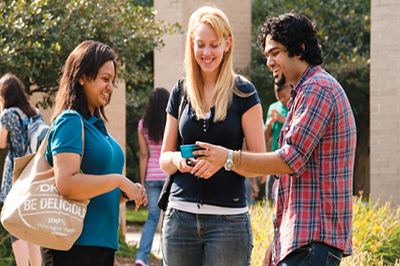Life as a junior can feel like can feel like an entire year of nonstop chaos. Between standardized tests, extracurricular activities and working (if you’ve got a job), not to mention finishing your homework, researching colleges can feel like the last straw that will break your high school back.
On the other hand, possibly one of the most fun and exciting parts about the college search is getting to scout schools in person. If you have the ability to do it, a campus visit could be the most useful key to unlocking what you’re truly looking for in a college. Here are some tips on how to plan for and make the most of campus visits.
RESEARCH FIRST
Start with a look at the website for each school you’re interested in to get an idea of what the campus looks like and whether it’s located in a city, a small town or out in the country. Many schools also have virtual campus tours on their websites, which can be helpful as a preliminary glance at the campus, as well as a window into the thoughts of people already attending. Lee Ann Backlund, vice president for enrollment planning at The University of the South (TN) suggests, “Before visiting any campus, students should be good ‘consumers’ and read the website and publications and have a sense of what the school offers. Don’t go on a campus visit without doing your homework—dig deeper in areas of specific interest.”
Keep a list of criteria as you do your research for each school. Is the university a big research campus or a small teaching-based college? How strong is your intended program of study at the school? What financial aid is offered, and how important is that to you and your family? What’s the student body like? How are the campus living situations set up? What fun traditions does the school have? Look at social media in addition to official websites. You can glean a lot of insights from what college students post about their schools.
“Perusing a website, various social media sites like Facebook or Twitter, then writing down questions, is always a good idea when visiting a school,” says Wivina Chmura, director of undergraduate admissions at Carlow University (PA). This gives the student a chance “to show the admission officer that they have done their research, and will save a lot of time in the interview if the student is prepared.” Speaking of which: after you do some online digging, be sure to make contact with an admissions counselor to tell them you’d like to visit. Remember, the admissions staff can’t help you if they don’t know you’re planning to come!
WHAT TO EXPECT ON YOUR VISIT
The first thing to do may be to schedule a tour with the admissions office on a day when school is in session, either in the spring of your junior year or early in the fall of your senior year. You’ll get a better feel for the campus if most classes are in session, rather than out for the summer.
Every college does things slightly differently for prospective students, but the day will probably start with a campus tour. Then you’ll most likely get to meet with current students, especially ones majoring in the programs in which you’re interested.
“While you are visiting, you should picture yourself as a student, roaming around campus,” says Hannah Bingham, first year admissions coordinator at University of North Carolina Wilmington. “If you feel a connection to the atmosphere, opportunities, students and staff, it may be a perfect fit.”
Some schools tailor their campus visits so they’re a little more customized. In addition to a standard walking tour, Georgia Southern University Director of Admissions Amy Smith says, “Georgia Southern also offers visits based on a student’s program of study. These visit days allow for in-depth review of a particular major, meetings with faculty and current students, and tours of lab facilities.” If you have a general idea of what you want to study, check with your schools to see if they offer more personalized tours.
Some tours might end with an interview with your admissions officer. Be prepared to show your interest in the school and to speak honestly and passionately about your own interests.
“Students should not shy away from asking questions,” says Cornell B. LeSane, II, dean of admissions at Allegheny College (PA). “And don’t be too modest. Students should talk about what they’re involved in, what they may bring to the campus community. This is their opportunity to shine.”
After the official visit is over, allow plenty of time to wander around and get your own take on things. Sit in on a lecture. Walk through the student union. Non-tour-guide students will probably give you some wonderfully genuine answers about their college experiences. “Talk to current students and recent graduates about their experiences,” says Ross VanDyke, director of admissions recruitment at Baylor University (TX). “They can paint a vivid picture of the campus community and culture.”
And another surprisingly easy way to really make the most of your experience is to look up and away from your phone—maybe even for the whole day. “If you are looking at your phone throughout the entire tour, you will not be able to see all the sights around you or soak up all that the campus has to offer,” says Bingham of UNCW. Putting away your phone will also demonstrate respect for the admissions staff and show them you are truly interested in attending the school.
You don’t have to stay on campus the whole time you’re visiting, either. Half the fun is exploring the town, city or wide-open prairie where the school is located. “Students can make more of their visit by asking for
recommendations of what else to do while they are here,” says Smith of Georgia Southern. That might include driving around the town, visiting a museum, going for a hike, attending a soccer game or asking where you can find the best cheeseburger.
THE IMPORTANCE OF VISITING
Now that most schools offer virtual tours and direct access to admissions counselors, you might think it’s fine to save time and money by skipping an in-person visit. But if you can swing it, it really can be worth it. Admissions officers take note of students who take the time to visit the campus. Personal contact can establish you in their memories.
“Only a visit could convey the culture of a school,” says Chmura of Carlow. “Do the faculty really care about a student’s success? Or will they be interacting with a teaching assistant for the entire first year? When you arrive on campus, is the staff friendly and welcoming? ‘Am I a name or a number? How long will it take me to get to class: five minutes or 20 minutes that includes a shuttle ride across campus?’ These are the questions students should be asking. It is important that they get the answers to the questions that are important to them.”
Many universities also provide financial aid for students to come out and visit on a case-by-case basis, or they might refund students for the campus visit after they’ve decided to enroll at the college. “There are a number of schools that will offer travel assistance for their overnight program,” confirms LeSane of Allegheny. “Really, any overnight schools offer some type of assistance.” Check with the schools you’re interested in to see if these are options before you decide not to visit because of financial reasons.
IF YOU CAN’T VISIT
Sometimes a student just isn’t able to visit a campus because of the distance or family circumstances. If that’s the case, you can still go the extra mile to show the school your interest.
“Request a Skype interview, meet your admission counselor at your school or in your area, and ask to connect with a current student or two to ask questions,” says Backlund of Sewanee. “Be proactive to learn as much as you can before decision-making time!”
You can check with your schools to see if they’ll be at a recruitment fair near you. Sometimes you can even have a college interview with an admissions counselor there.
“Your college education is a huge investment—of both time and money,” says VanDyke of Baylor. “The college or university you choose is going to be the place you live, learn …[and] play … for the next several years. Visiting campus will help you truly get a sense of whether a particular school is the right place for you.”
Jill Hicks is a writer and editor living in the Twin Cities.
HOW TO GET A TRUE FEEL FOR THE SCHOOL
- Make a list of questions you can’t find answers to anywhere else. Don’t ask the questions that are likely addressed on brochures and websites.
- Once on campus, talk to different students, and if possible, visit their dorm rooms.
- Meet with someone in the financial aid office. Financial aid officers at each school can provide you with information about scholarship deadlines and help you make a timeline.
- Read the college newspaper or arts magazine.
- Attend a sporting event, a concert or any sort of cultural activity the university has on the schedule for the day.
- Look at the bulletin boards around campus to see what sorts of activities and clubs are active.
- Research a professor in your field of interest—then, before your visit, request an appointment to stop in during his or her office hours.
- By the time you get home from your college visit, you might forget what the university was like. Take some photos and specific notes of moments or places you really loved.
- You might also be able to follow students or faculty members you’ve met on social media to stay updated about events going on at the school.



